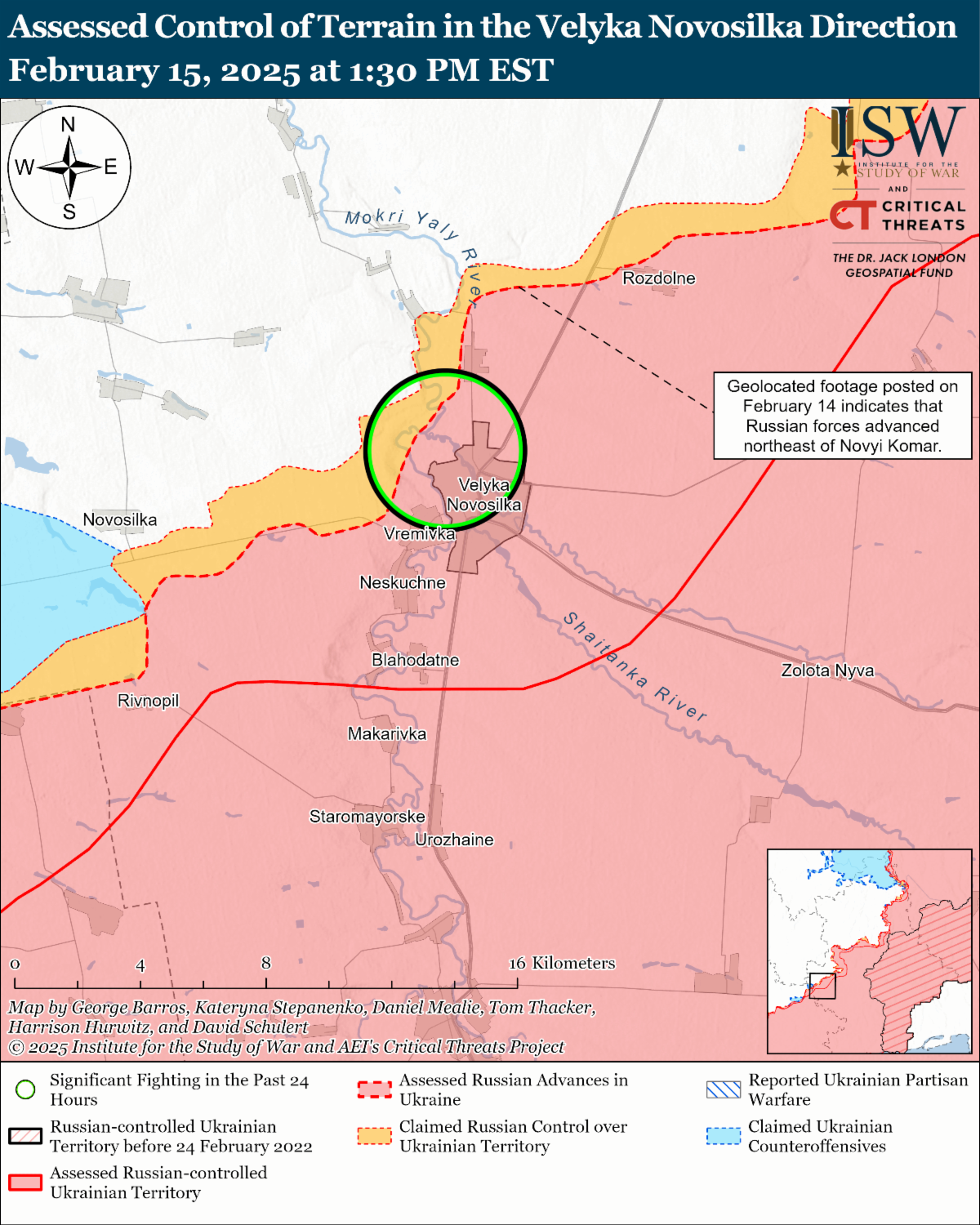Ukrainian President Volodymyr Zelensky warned that Russian President Vladimir Putin is attempting to create conditions to frame Putin as the victor over US President Donald Trump in negotiations. Zelensky stated during his address at the Munich Security Conference on February 15 that Putin intends to cut Ukraine out of negotiations about the resolution of the war in Ukraine and conduct direct bilateral negotiations with the United States. ISW has previously noted that Putin has recently attempted to present himself as equal to Trump and to present Russia as a global power comparable to the United States and as an heir to the Soviet Union's "superpower" status. Zelensky stated that Putin wants to embarrass Trump and have Trump attend the Russian Victory Day Parade — which highlights Russia's role in defeating Nazi Germany during the Second World War — on May 9 as a "prop." Zelensky's warning aligns with a report from Russian opposition news outlet Meduza that the Kremlin instructed Russian state media to reduce reporting about Trump and instead portray Putin as a strong and decisive leader, as well as to frame the February 12 Putin-Trump phone call as a victory for Putin. Zelensky also stated that Trump has not discussed the prospect of having other European states participate in negotiations and that Ukraine and the rest of Europe need to present a united front to Putin and Europe needs to participate in decisions about its own future. The Kremlin has routinely attempted to portray the US as the only other relevant actor in Ukraine besides Russia to deny Ukraine's agency in future negotiations and set conditions to convince the US to ignore Ukraine's interests, all likely to demand significant concessions in Russia's favor. Zelensky also reiterated his warning that Russia will field 15 new divisions and use military exercises in Belarus to threaten NATO.
Ukrainian and US officials continue to provide details on upcoming peace negotiations to end the war. Zelensky told Newsmax on February 15 that Russian forces at "minimum" need to withdraw to the pre-full scale invasion frontline and reiterated his commitment to ending the war in 2025. US Special Representative for Russia and Ukraine Keith Kellogg stated that the US aims to engage "all parties in a peace process" within 180 days (by roughly August 2025) and noted that other European states would not "be at the table" in peace negotiations but that the US will consider their points of view.
Key Takeaways:
- Ukrainian President Volodymyr Zelensky warned that Russian President Vladimir Putin is attempting to create conditions to frame Putin as the victor over US President Donald Trump in negotiations.
- Ukraine's US and European partners continue to work to jointly develop Ukraine's defense industrial base (DIB).
- Kremlin-controlled state media used an interview with Kremlin-affiliated former Ukrainian Verkhovna Rada Deputy Viktor Medvedchuk to reiterate the Kremlin's false narrative about Ukrainian President Volodymyr Zelensky's illegitimacy and Russia's longstanding goal of destroying the Ukrainian state.
- Russian advances south and southwest of Pokrovsk have slowed over the last two weeks amid indications that the Russian military command may prioritize offensive operations against Kostyantynivka — the southernmost point of Ukraine's fortress belt in Donetsk Oblast — in Spring and Summer 2025.
- Russian advances may be slowing south of Pokrovsk due to degradation among frontline Russian units and intensified Ukrainian drone operations in the area.
- The Russian military command may also intend to prioritize assaults on Kostyantynivka in 2025 and are thus reportedly not reinforcing the Russian force grouping south of Pokrovsk.
- Russian cargo vessels have continued to evacuate military assets from the port of Tartus as Russia negotiates its presence in Syria with the interim government.
- Ukrainian forces recently advanced near Pokrovsk, and Russian forces recently advanced near Toretsk and Velyka Novosilka and in Kursk Oblast.
- Russian occupation authorities continue to create regional analogues to the federal "Time of Heroes" program, which aims to place veterans of the war in Ukraine in government positions as part of Kremlin efforts to integrate occupied Ukraine into Russia and militarize society and government.
| 




 [ISW] 이란 업데이트, 2025년 2월 16일
[ISW] 이란 업데이트, 2025년 2월 16일
 [ISW] 이란 업데이트, 2025년 2월 15일
[ISW] 이란 업데이트, 2025년 2월 15일